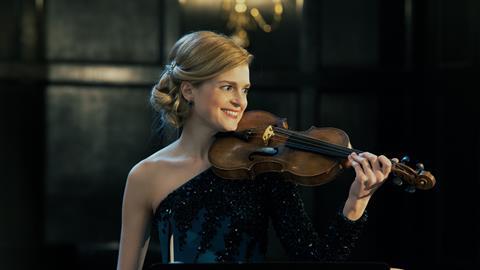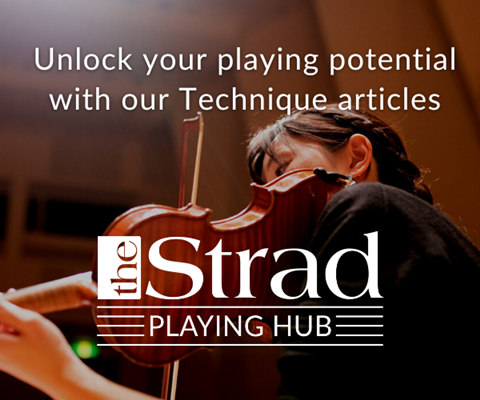Looking after your body is the key to meeting the physical demands of a busy performance lifestyle, writes violinist Davina Clarke

Explore more Technique like this in The Strad Playing Hub
If you told me during the height of the pandemic that this month I would have just released my debut solo album, I wouldn’t have believed you. In just a few months, I went from performing in Carnegie Hall to being almost unable to lift my left arm up from my side, which could’ve been altogether avoided had I known more about muscular health.
As string players, we are essentially athletes. Our upper bodies are running the equivalent of a marathon every single day while we rehearse and perform. Long-standing postural adaptations from an early age when our immature skeletal frame is growing, result (certainly in the case of violinists) in an asymmetrical development of muscles. However, we don’t often treat ourselves as long-distance sportspeople, with warm-ups and downs not usually a priority after extensive periods of playing. I had no idea that putting a pause on intense performing for months would cause my highly-trained muscles to flounder and even start to realign in a new position, which was alien to my playing physique. It seems obvious now, but before the pandemic I’d rarely had more than a week away from my violin.
As string players, we are essentially athletes
The pandemic put an almost complete stop to my high-flying, adrenaline-fuelled life, which was replaced with sedentary online teaching, podcasting, and trying to keep myself driven and musically active in an entirely new way. I spent many hours daily in front of a screen, leaning forward on my elbows and wrists, my neck unintentionally craned. This resulted in severe shoulder, jaw and neck pain and a loss of conditioning in my shoulder girdle, which caused a reduction of strength and endurance in my posterior shoulder muscles.
No longer being kept fit by playing, I was faced with muscular deterioration and a loss of movement range. It was terrifying. With the help of my incredible physiotherapist, Pippa Rollitt and a team of consultants, I was able to begin my recovery.
Thankfully I am now back to peak physical fitness, but during my journey I realised that prehab is just as important as rehab. Usually, busy touring lifestyles do not give much space for illness or injury and we often only investigate a problem when more severe symptoms arise. As the saying goes, prevention is better than cure, so it is my pleasure to share with you these tips for good muscular health as a performer:
Read: Musicians and exercise: Can a keep fit regime make you a better string player?
Read: Technique: achieving balance between the chin and left thumb
1. Take time to warm-up before sitting down to play for a rehearsal session.
Some gentle stretching and body movement, having warm hands and wrists and arriving in time to feel relaxed and focused.
2. Keep your muscles and tendons warm
I swear by Turtle Doves wrist warmers, having a small hot water bottle when playing in a cold church, and if that is not possible, putting an adhesive heat patch on any areas of pain.
3. Incorporate muscular strengthening exercises to prevent injury, which include:
Chin tucking and cervical side bending; lying nod; pectoral stretches using a doorway; and a latissimus dorsi stretch.
4. Try some soothing physio exercises to calm muscles after a long day of playing
Lying in supine position, either on the floor or an acupressure mat and doing deep breathing, or lying with a rolled up hand towel between your shoulder blades, whilst the head is supported with a pillow. This can be varied by moving your arms above your head or placing them spread-eagle style either side of you. I also highly recommend keeping a small acuball handy to massage into areas of discomfort in the back and shoulders.
Read: Violinist David Juritz on overcoming a painful shoulder injury
Read: London Symphony Orchestra violinist Lennox Mackenzie on treating a shoulder injury
Read: LA Philharmonic violist Leticia Oaks Strong on curing a frozen shoulder
5. Take hot baths with magnesium flakes
I try to have one of these every night or day, no matter the time - even at 3 am after a late concert and a trip to the pub! It works wonders and relaxes the muscles, ensuring a much more restful sleep. I usually combine this with a short guided mindfulness exercise.
6. Swimming
If possible, this low impact, gentle exercise is wonderful to open chest muscles and to get some movement in the upper body, and can be as intense or relaxing as you like.
7. Take a break from performing
If this is more than a few weeks at a time, try to do a little gentle playing every day. Even 15 minutes of scales or working through a study is enough to keep your usual ‘playing’ muscles engaged, lessening the shock of going back into a busy concert schedule.
8. Sleep
Prioritising sleep is tricky; there are always more fun things to do, parties to go to after concerts, repertoire to prepare or daily family life to manage. But for me, good sleep hygiene and getting a minimum of 8 hours a night whenever possible makes a huge difference for repairing those tired muscles.
Performing life can be busy and stressful, and it always seems as if there is something more important to do than prioritise yourself. I feel like a total superhero if I can incorporate even one of these things into my day or week, but when I do, it puts both my mind and body at ease and I’m even more ready to face the exciting challenges on the platform.
Davina Clarke is a British violinist, internationally renowned in baroque and classical repertoire. She regularly performs with early music ensembles including the English Baroque Soloists, Orchestre Révolutionnaire et Romantique and the Academy of Ancient Music. Her new album, Sweet Stillness, is now available for purchase and to stream on all platforms here.
Watch: ‘Glorious and upbeat energy’: Violinist Davina Clarke performs ‘Meine Seele’
Read: Three ways to take care of your health when touring
Read: Dealing with Dystonia
Explore more Technique like this in The Strad Playing Hub












































No comments yet